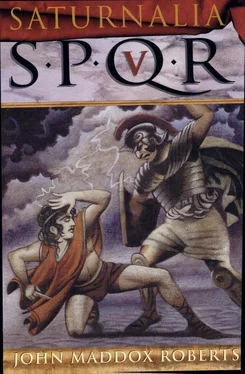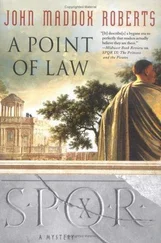John Roberts - Saturnalia
Здесь есть возможность читать онлайн «John Roberts - Saturnalia» весь текст электронной книги совершенно бесплатно (целиком полную версию без сокращений). В некоторых случаях можно слушать аудио, скачать через торрент в формате fb2 и присутствует краткое содержание. Год выпуска: 0101, ISBN: 0101, Издательство: St. Martin, Жанр: Исторический детектив, на английском языке. Описание произведения, (предисловие) а так же отзывы посетителей доступны на портале библиотеки ЛибКат.
- Название:Saturnalia
- Автор:
- Издательство:St. Martin
- Жанр:
- Год:0101
- ISBN:9780312320188
- Рейтинг книги:4 / 5. Голосов: 1
-
Избранное:Добавить в избранное
- Отзывы:
-
Ваша оценка:
- 80
- 1
- 2
- 3
- 4
- 5
Saturnalia: краткое содержание, описание и аннотация
Предлагаем к чтению аннотацию, описание, краткое содержание или предисловие (зависит от того, что написал сам автор книги «Saturnalia»). Если вы не нашли необходимую информацию о книге — напишите в комментариях, мы постараемся отыскать её.
Saturnalia — читать онлайн бесплатно полную книгу (весь текст) целиком
Ниже представлен текст книги, разбитый по страницам. Система сохранения места последней прочитанной страницы, позволяет с удобством читать онлайн бесплатно книгу «Saturnalia», без необходимости каждый раз заново искать на чём Вы остановились. Поставьте закладку, и сможете в любой момент перейти на страницу, на которой закончили чтение.
Интервал:
Закладка:
FreedmanA manumitted slave. Formal emancipation conferred full rights of citizenship except for the right to hold office. Informal emancipation conferred freedom without voting rights. In the second or at latest third generation, a freedman’s descendants became full citizens.
Gracchi, theIn the late second century B.C. the brothers Tiberius and Gaius Gracchus, although members of the nobility, championed the cause of the urban and rural poor. The Senate regarded them as dangerous radicals. Tiberius was killed by a mob and Gaius forced to commit suicide. Eventually, almost all their reforms were adopted by the Senate and they were revered by the plebeians. Their mother, Cornelia, was always referred to as Mother of the Gracchi and became the model for the Roman mother who raised her sons to serve the public good whatever the cost.
Haruspex A member of a college of Etruscan professionals who examined the entrails of sacrificial animals for omens.
Imperium The ancient power of kings to summon and lead armies, to order and forbid and to inflict corporal and capital punishment. Under the Republic, the imperium was divided among the consuls and praetors, but they were subject to appeal and intervention by the tribunes in their civil decisions and were answerable for their acts after leaving office. Only a dictator had unlimited imperium .
Insula Literally, “island.” A detached house or block of flats let out to poor families.
Janitor A slave-doorkeeper, so called for Janus, god of gateways.
LegionThey formed the fighting force of the Roman army. Through its soldiers, the Empire was able to control vast stretches of territory and people. They were known for their discipline, training, ability, and military process.
LictorBodyguards, usually freedmen, who accompanied magistrates and the Flamen Dialis , bearing the fasces. They summoned assemblies, attended public sacrifices, and carried out sentences of punishment.
Ludus (pl. ludi). The official public games, races, theatricals, etc. Also training schools for gladiators, although the gladiatorial exhibitions were not ludi.
Mollossian HoundThese were enormous dogs renowned in antiquity for their ferocity. Probably some sort of mastiff rather than true hounds, they were originally hunting dogs but were bred to fight. They were used to execute felons in the arena, hunt runaway slaves, and by the army to run down fleeing enemies. What they looked like is unknown but they were universally acknowledged to be terrifying.
Munera Special games, not part of the official calendar, at which gladiators were exhibited. They were originally funeral games and were always dedicated to the dead.
Mundus An opening into the underworld. There were several located around the Mediterranean. They were used for rituals involving the cthonic deities and to convey messages to the dead.
Municipia Towns originally with varying degrees of Roman citizenship. A citizen from a municipium was qualified to hold any public office. An example is Cicero, who was not from Rome but from the municipium of Arpinum.
Novus Homo Literally, “new man.” A man who is the first of his family to hold a curule office in Rome, giving his family the status of nobiles.
October Horse, theEach year, in mid-October, a horse race was held in honor of Mars. The winning horse was sacrificed and beheaded, then the men of two city districts, the Via Sacra and the Subura, fought over the head, each trying to carry it back to their own district, where it would be displayed and bring the district good fortune for the next year. It was a rite so old that the Romans no longer remembered why they did it.
Offices A Tribunewas a representative of the plebeians with power to introduce laws and to veto actions of the Senate. Only plebeians could hold the office, which carried no imperium . Military tribunes were elected from among the young men of senatorial or equestrian rank to be assistants to generals. Usually it was the first step of a man’s political career.
A Roman embarked on a political career had to rise through a regular chain of offices. The lowest elective office was quaestor :bookkeeper and paymaster for the treasury, the grain office, and the provincial governors. These men did the scut work of the Empire.
Next were the aediles. They were more or less city managers who saw to the upkeep of public buildings, streets, sewers, markets, and the like. There were two types: the plebeian aediles, and the curule aediles. The curule aediles could sit in judgment on civil cases involving markets and currency, while the plebeian aediles could only levy fines. Otherwise, their duties were the same. They also put on the public games. The government allowance for these things was laughably small, so they had to pay for them out of their own pockets. It was a horrendously expensive office but it gained the holder popularity like no other, especially if his games were spectacular. Only a popular aedile could hope for election to higher office.
Third was praetor, an office with real power. Praetors were judges, but they could command armies and after a year in office they could go out to govern provinces, where real wealth could be won, earned, or stolen. In the late Republic there were eight praetors. Senior was the praetor urbanus, who heard civil cases, between citizens of Rome. The praetor peregrinusheard cases involving foreigners. The others presided over criminal courts. After leaving office, the ex-praetors became propraetorsand went to govern propraetorian provinces with full imperium .
The highest office was consul. Supreme office of power during the Roman Republic. Two were elected each year. For four years they fulfilled the political role of royal authority, bringing all other magistrates into the service of the people and the city of Rome. The office carried full imperium . On the expiration of his year in office, the ex-consul was usually assigned a district outside Rome to rule as proconsul. As proconsul, he had the same insignia and the same number of lictors. His power was absolute within his province. The most important commands always went to proconsuls.
Censorswere elected every five years. It was the capstone to a political career but it did not carry imperium and there was no foreign command afterward. Censors conducted the census, purged the senate of unworthy members, and doled out the public contracts.They could forbid certain religious practices or luxuries deemed bad for public morals or generally “un-Roman.” There were two censors, and each could overrule the other. They were usually elected from among the ex-consuls, and the censorship was regarded as the capstone of a political career.
Under the Sullan Constitution, the quaestorship was the minimum requirement for membership in the Senate. The majority of senators had held that office and never held another. Membership in the Senate was for life unless expelled by the censors.
No Roman official could be prosecuted while in office, but he could be after he stepped down. Malfeasance in office was one of the most common court charges.
The most extraordinary office was dictator. In times of emergency, the senate could instruct the consuls to appoint a dictator, who could wield absolute power for six months. Unlike all other officials, a dictator was unaccountable: He could not be prosecuted for his acts in office. The last true dictator was appointed in the third century B.C. The dictatorships of Sulla and Julius Caesar were unconstitutional.
Читать дальшеИнтервал:
Закладка:
Похожие книги на «Saturnalia»
Представляем Вашему вниманию похожие книги на «Saturnalia» списком для выбора. Мы отобрали схожую по названию и смыслу литературу в надежде предоставить читателям больше вариантов отыскать новые, интересные, ещё непрочитанные произведения.
Обсуждение, отзывы о книге «Saturnalia» и просто собственные мнения читателей. Оставьте ваши комментарии, напишите, что Вы думаете о произведении, его смысле или главных героях. Укажите что конкретно понравилось, а что нет, и почему Вы так считаете.









